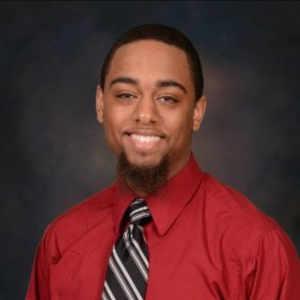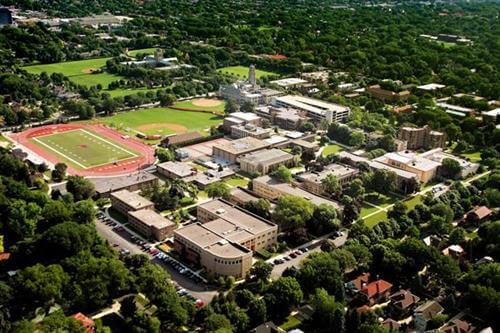 For this installment in the series of alumni career profiles, Eman Ghanayem, a graduate student and instructor in the Department of English, interviewed Keena Griffin, who obtained his BA in English at UIUC in 2013. Keena currently works as an admission counselor at Concordia University in Chicago. He had great advice for English majors who hope to have careers that give them access to helping students and providing academic counseling.
For this installment in the series of alumni career profiles, Eman Ghanayem, a graduate student and instructor in the Department of English, interviewed Keena Griffin, who obtained his BA in English at UIUC in 2013. Keena currently works as an admission counselor at Concordia University in Chicago. He had great advice for English majors who hope to have careers that give them access to helping students and providing academic counseling.
What is your current job? How did you get there? What do you like about it? Where do you hope to go from here?
I currently work as an Admission Counselor for a university. I started my career after graduation by working for the Illinois College Advising Corps (ICAC), which was a partner organization with the University of Illinois system designed to help underserved high school students navigate the college admission process to choose the right school for them. The jump to becoming an Admission Counselor was a natural step from there. With ICAC, I loved seeing the excitement of high school students who realized that college was not only possible for them, but that they had multiple options to choose from. Now I have the opportunity on the collegiate side to work with incoming students and help make the admission process manageable. I want to continue working with students throughout my career, and focus on the areas of college access and retention for underserved students.
How has your English degree helped you? What skills that you learned in your college classes do you find yourself using now?
Getting a degree in English was the best thing I could have done in college. Learning to connect with and understand people’s stories and being empathetic with people’s backgrounds is a key to success in any endeavor – professional or otherwise. At the same time, the courses in UIUC’s English program helped me develop marketable skills such as critical analysis and interpersonal communication (which is somewhat of a dying art). I’m able to focus on the important details of any situation that can present a problem, and help develop solutions. My classes on critical literary theory (my favorite subject) taught me how to approach and interpret literary texts from multiple perspectives, and I use the same techniques when problem-solving issues that occur in work or life.
What other parts of your college experience do you continue to draw on?
While I was a student at UIUC, I volunteered with a few student organizations through the Bruce D. Nesbitt African American Cultural Center and discovered my passion for working with people in the higher education setting. In particular, 100 STRONG is an organization that helps underrepresented students on campus adjust socially and academically to life at Illinois. I came from a small high school where I graduated with 106 classmates. Making the adjustment to Illinois would have been much more difficult if I hadn’t met people through 100 STRONG who cared about my success. They told me “once you’re here, we don’t want you to leave without your degree.” That resonated with me, and even when I had some struggles early on in my academic career people were there for me. When I got the opportunity to become one of the upperclassman responsible for reaching out to new students, I grabbed it and never looked back. Mentoring younger students became my passion, and it’s the reason I love working in higher education.
What was the best part of your college experience? And how did it affect you intellectually and/or professionally?
The best part was meeting people from backgrounds and perspectives different from my own. I met each of my best friends (can I give a shameless shout out to Lew, Ric, Dave, and Jeramie) by debating something with them and coming to respect their passion and opinions. That prepared me for the intellectual rigors of UIUC by challenging me to defend my thoughts/ideas, and prepared me for the professional world by giving me people to help hold me accountable. We constantly challenge and support each other to grow in our different paths.
What do you know now that you wish you had known in college? What advice do you have for current English/CW majors?
For anyone who’s considering a major or even a minor in English/CW, go for it and don’t stop. These academic programs at UIUC will make sure you get the skills you need to succeed in any number of professions, but they also expand your horizons and translate to life outside of school and work. Once I graduated, I was able to reflect and see just how much I’d learned from the English department – even when I didn’t think the lessons would be applicable to my future. Since graduation, I’ve had the opportunity to evaluate my own interests and pursuits, and I realized that my English degree only made me more curious about how the world works. The old saying “you don’t know what you don’t know” definitely rung true for me. After discovering so many cultures and experiences that I was unfamiliar with, I’ve been able to explore many different subjects that I’d never imagined I’d be interested in. My English degree taught me how to approach learning, and that it’s a constant, self-driven process.
What are some of your future professional goals? How do they connect to what you’re currently doing?
I want to continue working with students in the areas of access and retention, as well as college involvement. I’d like to eventually return to UIUC and serve as the director of the Bruce D. Nesbitt African American Cultural Center. I also want to further my own education, and my background in English has allowed me to expand my interest into other areas as well (Higher Education, African American Studies). As an Admission Counselor, I’m able to gain an understanding of the barriers to college access many students face, so my professional experience and academic interests definitely complement one another.
What advice do you have for students interested in exploring the field you’re in now? Who ought to consider pursuing a career like yours? What are some relevant skills to get/experience to build while still in college?
For anyone interested in working in college admissions or a non-teaching higher education role, it’s important to get involved on campus as soon as you can – but it’s never too late either. Illinois is a great place to start because the campus has every resource you can imagine. Working in admissions means knowing a little bit of everything about the school, just like an English degree teaches you a little of everything about different people and subject areas. Supplementing your classroom experience with internships, volunteer experience, and interpersonal experience is critical to any field you explore with an English degree because you have the chance to shape your own path. If you like working with people and you enjoy seeing young adults start to shape their own life courses – then college admissions work is definitely for you.

